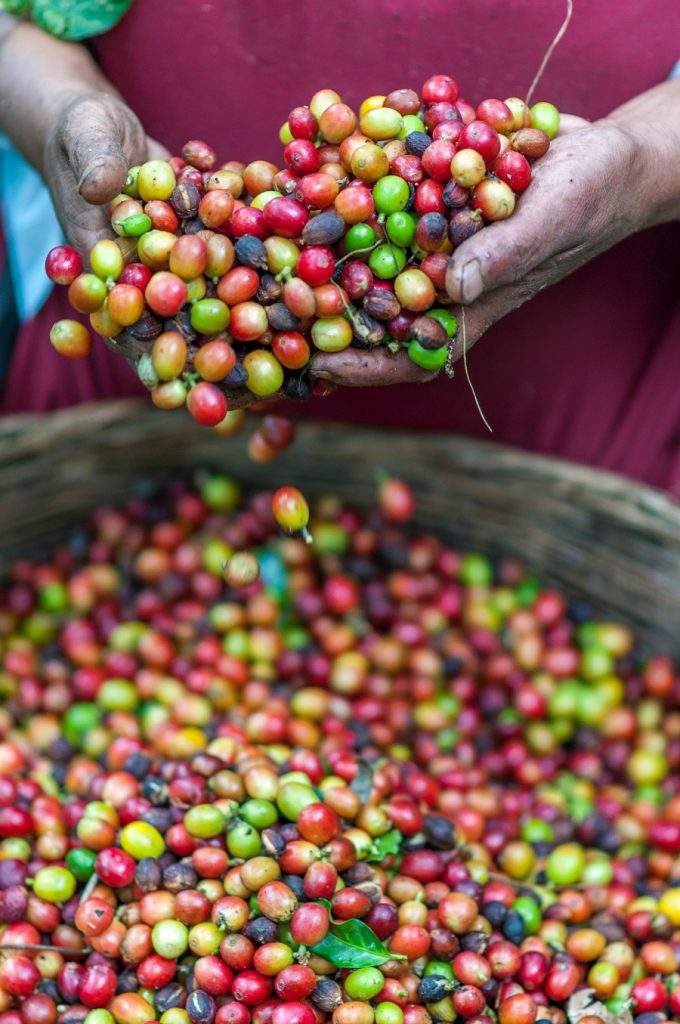Are Infused Coffee Profiles Good For Your Coffee Business?
Coffee Shop Discussion

Are Infused Coffee Profiles Good For Your Coffee Business?
 Coffee customers love options – whether or not they stick to their Americanos or vanilla lattes – many customers love visiting coffee shops with deep menus.
Coffee customers love options – whether or not they stick to their Americanos or vanilla lattes – many customers love visiting coffee shops with deep menus.
An upcoming trend in retail coffee is the growing availability of infused coffee and its unique flavor profiles.
To some, infused coffees might be slightly controversial and question-provoking, but it's fair to say that we may be seeing more infused coffees in retail stores in the next few months and coming years.
At SCA's World of Coffee in Athens last month, I attended a panel discussion exploring the impact that infused coffee has on retail coffee and the industry as a whole.
The introduction of ethical questions that it brings to the coffee industry is the primary concern of everyone involved, including those who promote the infusion of coffee to develop new tastes.
In this post, I will cover the topic from a retail coffee perspective and what it may mean for your coffee menu. We’ll also touch upon the retailers’ role in keeping the industry honest.
Trending Articles on Coffee Shop Startups:
| Coffee Shop Ideas & Concepts | Coffee Shop Budget and Planning |
|---|---|
| 50 Coffee Shop Ideas & Concepts | 7 Ways to Open a Coffee Shop with No Money |
| Low-Cost Coffee Shop Ideas | Open a Coffee Shop Bookstore |
| How to Open a Drive-Thru Coffee Stand | How Much do Coffee Shop Owners Make? |
What is Infused Coffee?
 Infused coffee occurs when flavors are added to the coffee bean during fermentation. Infusion is usually done at the processing level of coffee production, which is often done on or near coffee farms.
Infused coffee occurs when flavors are added to the coffee bean during fermentation. Infusion is usually done at the processing level of coffee production, which is often done on or near coffee farms.
For example, to infuse the flavor of pineapple, the fruit would be added during the fermentation process. In addition, yeast and other monocultures, such as sugar cane, are added.
Coffee fermentation occurs when the sugars break down the squishy mucilage surrounding the seed or bean, impacting its flavor.
Other fruits, such as passion fruit, guava, pineapple, etc., can be added to impact the ultimate flavor profile of the batch of coffee.
There are good resources online if you want to do a deep dive into the chemical process of coffee fermentation.
Why Would You Infuse Coffee With Other Flavors?
Why would you want to infuse coffee in the first place?
Ultimately, coffee is a business. As such, parts of the industry recognize the need to stay innovative. This may mean offering a variety of new or highlighted coffee flavors.
We can taste the flavor and aromatic difference between washed coffee and naturally dried coffee, as well as the intricacies of the geographical region (soil, climate, etc.) and, of course, how the coffee is roasted and brewed.
Like these mentioned factors, infused coffee adds new organic compounds to alter tastes coffee drinkers may want.
These new flavors, in turn, can attract new customers and push the envelope with established coffee drinkers. They serve to create new products and expand their market. “The market always wants something new,” said Rodrigo Sanchez of Pitalito Huila coffee farm in Colombia.
While we see a wide variety of espresso-based and coffee-based drinks, the demand for even more flavor variety pushes farmers, roasters, and baristas to look at new, innovative ways to entice customers. And it appears that there is some interest. Because much of the infused coffee is processed on small to medium farms – and transparency of volume produced calls any existing data into question, there isn't an official number on the volume of infused coffee produced every year. Roast Magazine generally estimated that about 10,000 bags of infused coffee will be produced in 2023. It truly is a tiny fraction of the overall annual production of coffee.
Is There a Problem With Infused Coffee?
 An acknowledged problem by the panel is transparency. It is essential to ensure that consumers know what type of coffee they are getting and how it is processed, is essential in order to maintain confidence in the industry.
An acknowledged problem by the panel is transparency. It is essential to ensure that consumers know what type of coffee they are getting and how it is processed, is essential in order to maintain confidence in the industry.
Highlighting a specific fruity taste but not disclosing that the coffee was fermented with a particular fruit or flavor is wrong for obvious reasons. It can pose certain dangers as well. For example, if a coffee drinker is allergic to pineapple, a pineapple-infused bean would pose a health problem.
Additionally, new additives can dramatically influence coffee-tasting competitions or barista competitions and quality ratings.
Chipping Away at Coffee Tradition
Some coffee traditionalists or purist coffee drinkers may think it's sacrilegious to add anything to coffee at the processing stage. After all, is high-valued coffee that is infused with fruit still to be considered specialty coffee?
I would agree with this premise.
Once you infuse other products and alter the coffee at the processing stage, should it still be considered the same product? Not at all – in my opinion.
But then again, it's okay to be experimental to alter tasting profiles at the processing level, just as roasters vary the taste profiles by mixing various single-origin coffee blends. It can be a boon for new interest in coffee and the development of beverages that consumers would like.
However, transparency is the key.
Knowing what type of coffee bean you are buying and consuming is essential. Only transparency – from a medical and health perspective to an economic and quality outlook- will help ensure integrity throughout the coffee industry.
Only transparency will allow for the full enjoyment of greater experimentation and an appreciation for the skills, methods, and science behind the infusion or fermenting process.
Once transparency and clarity are held as banners for the industry, I think we should have fun with infused coffees. New beverages, canned or cold-brew products, can be created for people's enjoyment. And it could help innovative farmers, producers, roasters, and baristas.
How are the Fruit or Added Ingredients Controlled for Quality?
Can you guarantee quality?
There are also appropriate questions on the origin and quality of the fruit or other ingredients used in the fermentation process. The farmer would and should disclose the source of fermented fruit and its quality – this may be hard to do.
Nevertheless, the quality control of the added ingredients should be addressed and clearly labeled. Coffee brokers and roasters should also share this information directly with the consumer.
Quality control methods should be instituted throughout the industry to guarantee quality, safety, and correct labeling.
Are Infused Coffees Good For Your Coffee Business?

Is it “Infused” or “Co-Fermented” Coffee?
Some members of the panel and the audience in Athens believed a better term to describe what was happening to the coffee should be characterized as “co-fermentation.” Since co-fermentation is what is actually occurring. This relabeling may give everyone a better understanding of what made the tasting profile change.
Barista Competitions
At this point, I don't think that such co-fermented beans should be used in barista competitions. The altering of flavor profiles would serve as an advantage over other competitors.
Currently, the World Barista Championship rules don't allow for such coffees:
“Coffee may not have any additives, flavorings, colorings, perfumes, aromatic substances, liquids, powders, etc. of any kind added at any point between the time the coffee is picked (as cherry) to when it is extracted into beverage.”
Does Using Infused Coffee Work For Your Coffee Shop?
Infused or co-fermented coffee may work for your coffee shop, but it will require you to promote it and share the details of the coffee processing with your customers. It also includes educating a customer about coffee tasting since infused coffee flavors are very subtle, and it might be difficult to taste the fruity notes.
Nevertheless, new tastes or highlighted notes will likely intrigue your customers and deliver sales. With the right marketing, there may be a place for infused coffee at your coffee shop.
Perhaps to benefit from the flavor subtleties, espresso shots, pour-overs, and cold brewed coffee may make for good options.
The variety of tastes from infused coffee may get lost in beverages with lots of syrups, sugar, and other ingredients. If you start a coffee shop, you want to be able to offer your customers “traditional” coffees. However, infused coffees might appeal to your customer base – especially if you spend time educating your customers and promoting your beverages.
Are Infused Coffee Profiles Good For Your Coffee Business?
What do you think?
Is alternating coffee at the processing level harmful to the overall industry? Would you consider using it in your coffee shop?
Leave a comment on our Instagram Post.
Additional Questions:
How Should You Choose Your Coffee Equipment?
Your coffee shop equipment is among the biggest expenses you'll have encountered when setting up your coffee shop startup budget. Ultimately, your coffee shop menu determines what type of equipment you'll need. Of course, other factors like your coffee shop concept, budget, and space requirements will play a big role in choosing your equipment as well. We explore your coffee shop equipment needs in our post, What Equipment Do You Need to Open a Coffee Shop?
Can You Make Money Starting and Running a Coffee Shop?
Yes! You can make money running a coffee business. But operating a successful business never happens on autopilot. Managing and steering your coffee business requires you to be thoroughly engaged on many fronts: From your paperwork and taxes (administrative), to hiring & firing, customer service, inventory management, and your coffee shop marketing and promotion. For an in-depth look at how much money you can make running a coffee shop, read our post, How Much Money Does a Coffee Shop Owner Make?
What Kind of Coffee Shop POS System Do We Recommend?
We are fortunate to operate our coffee business during a time when we have a variety of point-of-sale options. But not all of them are great for coffee shops. That's why we recommend the Square POS system. We've written an in-depth review of Square's advantages for coffee shops in our post, Best Coffee Shop Point-of-Sale System Review.

Ready to Get Started?
Start Your Dream Coffee Shop Business
Starting a coffee shop is exciting, but it can also feel overwhelming. Where do you start? What steps should you take? How do you avoid costly mistakes? That’s where the Professional Coffee Shop Startups Kit comes in. It’s designed to give you a clear, practical roadmap to opening a successful coffee business—without wasting time or money on guesswork.
Inside, you'll find:
![]() Expert interviews with real coffee shop owners and business experts.
Expert interviews with real coffee shop owners and business experts.
![]() An On-Demand 37-lecture course covering everything from business planning to daily operations.
An On-Demand 37-lecture course covering everything from business planning to daily operations.
![]() Editable coffee shop business templates, financial documents, checklists, and planning tools to keep you on track.
Editable coffee shop business templates, financial documents, checklists, and planning tools to keep you on track.
![]() A step-by-step startup guide that walks you through concept development, permits, branding, and more.
A step-by-step startup guide that walks you through concept development, permits, branding, and more.
![]() Cost-saving strategies to help you launch your coffee business on a budget.
Cost-saving strategies to help you launch your coffee business on a budget.
Whether planning a small coffee cart or a full-scale café, this kit is built to help you start confidently. Join the thousands of successful coffee entrepreneurs who started with a dream and a great plan. Your journey to coffee shop greatness begins right here!
Comprehensive. Proven. Affordable.
The Professional Coffee Shop Startup Kit
(Instantly Delivered To You)
* The information on this page is for educational purposes only. We do not offer legal or investment advice.












